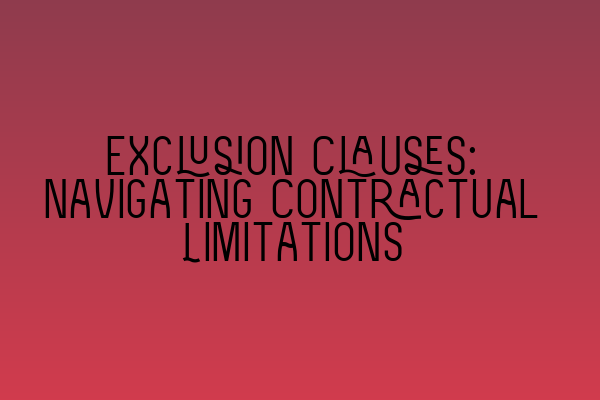Exclusion Clauses: Navigating Contractual Limitations
As a solicitor, it is crucial to have a deep understanding of exclusion clauses and their implications in contract law. Exclusion clauses are contractual provisions that aim to limit or exclude liability for certain types of loss or damage. These clauses play a vital role in allocating risks and responsibilities between parties to a contract.
In this blog post, we will explore the essentials of exclusion clauses, including their types, enforcement, and potential pitfalls. Whether you are a solicitor, a business owner, or someone seeking legal advice, this article will give you the knowledge you need to navigate contractual limitations confidently.
The Types of Exclusion Clauses
Exclusion clauses come in various forms, each serving a specific purpose in contract law. Let’s delve into the different types:
1. Exclusion of Liability Clauses
These clauses aim to exclude liability for breach of contract, negligence, or other causes of action. Businesses often include such clauses to limit their potential exposure to damages, especially in high-risk industries or situations.
For example, a construction company might include an exclusion of liability clause that limits their responsibility for any damage caused during a project. However, it’s important to note that exclusion of liability clauses must be carefully drafted to be enforceable. They shouldn’t be unfair or unreasonable, as this might render them void or unenforceable in court.
2. Limitation of Liability Clauses
These clauses, also known as limitation clauses, work differently from exclusion clauses. Instead of excluding liability altogether, they aim to cap the amount of damages that can be claimed in the event of a breach of contract or negligence.
Limitation of liability clauses can be beneficial for both parties involved. They allow the party seeking protection to limit their potential financial exposure, while the other party benefits from a more predictable and manageable risk scenario.
3. Indemnity Clauses
Indemnity clauses, sometimes referred to as hold harmless clauses, are contractual provisions that place the obligation to compensate for specific losses or damages incurred on one party. These clauses provide protection to the indemnified party against potential future liabilities arising from actions or omissions of the other party.
For instance, in a services agreement, an indemnity clause might require the service provider to indemnify the client against any claims arising from the provider’s negligence. Indemnity clauses, like other exclusion clauses, must be carefully crafted to be enforceable and should not be unconscionable or contrary to public policy.
Enforceability of Exclusion Clauses
While exclusion clauses can provide valuable protection, their enforceability is subject to specific legal principles. It is essential for solicitors and other legal professionals to understand these principles to ensure the validity of exclusion clauses.
1. Incorporation
For an exclusion clause to be enforceable, it must be incorporated into the contract. Incorporation can occur through various means, such as:
- Express terms: The exclusion clause is clearly stated and agreed upon by both parties.
- Implied terms: The exclusion clause is inferred by the court based on the nature of the contract and the intentions of the parties.
- Previous course of dealings: The exclusion clause has been consistently used in prior contracts between the parties.
It’s important to note that exclusion clauses must be brought to the attention of the other party before or at the time of contract formation. Failing to do so may render the clause unenforceable.
2. Reasonableness
Even if an exclusion clause is properly incorporated, it must still meet the test of reasonableness as per the Unfair Contract Terms Act 1977 (UCTA) or the regulations set forth by the Consumer Rights Act 2015 (CRA). These statutes provide criteria for assessing the reasonableness of exclusion clauses based on factors such as:
- The bargaining position of the parties
- The transparency and clarity of the clause
- The nature and subject matter of the contract
- Any inducement provided to the consumer to accept the clause
It is essential to carefully review the circumstances surrounding the contract and determine whether the exclusion clause can withstand the test of reasonableness. Solicitors can provide expert advice on this matter.
Pitfalls to Avoid
While exclusion clauses can offer valuable protection for parties involved in a contract, certain pitfalls must be avoided to ensure their enforceability:
1. Unfair Terms
An exclusion clause that is deemed unfair or unreasonable is likely to be unenforceable. To ensure fairness, solicitors should review exclusion clauses meticulously and assess whether they meet the legal requirements laid out in UCTA or the CRA.
2. Ambiguity
Ambiguous or unclear wording can create uncertainty and confusion regarding the extent and scope of the exclusion clause. It is crucial to draft exclusion clauses using precise and unambiguous language to eliminate the risk of disputes over interpretation.
3. Failure to Update
Exclusion clauses should be regularly reviewed and updated to remain relevant and enforceable. Legal professionals should ensure that exclusion clauses reflect any changes in legislation or business practices that may impact their validity.
4. Ignoring Consumer Protection Laws
When dealing with consumers, solicitors must be particularly cautious, as consumer protection laws offer additional safeguards. Exclusion clauses may be subject to stricter scrutiny under these laws, demanding compliance with specific requirements to ensure fairness and transparency.
Conclusion
Exclusion clauses are powerful tools within the realm of contract law, allowing parties to allocate risks and limit liabilities. However, one must navigate these contractual limitations with care. By understanding the types of exclusion clauses, their enforceability requirements, and the potential pitfalls, solicitors can effectively protect their clients’ interests and ensure the validity of these crucial provisions.
Related Articles:
- Barrister vs. Solicitor: A Comprehensive Comparison
- Embracing the Rise of Virtual Law Practices
- Unveiling Real-Life Case Studies: Insights into Legal Practice and Decision-Making
- Exploring Solicitor Salaries in the UK: Average Earnings and Factors Affecting Income
- Mastering Client Relationship Management: Skills for Solicitors to Enhance Trust and Loyalty
